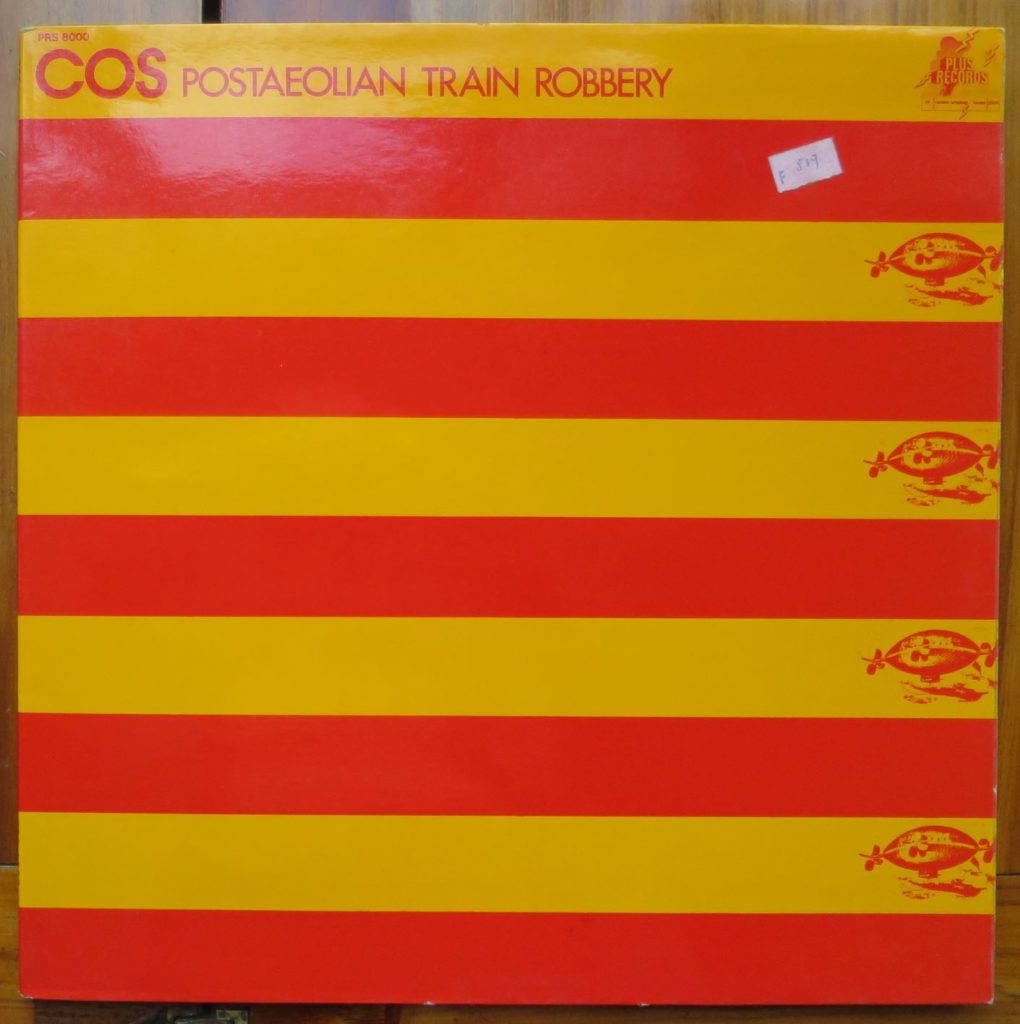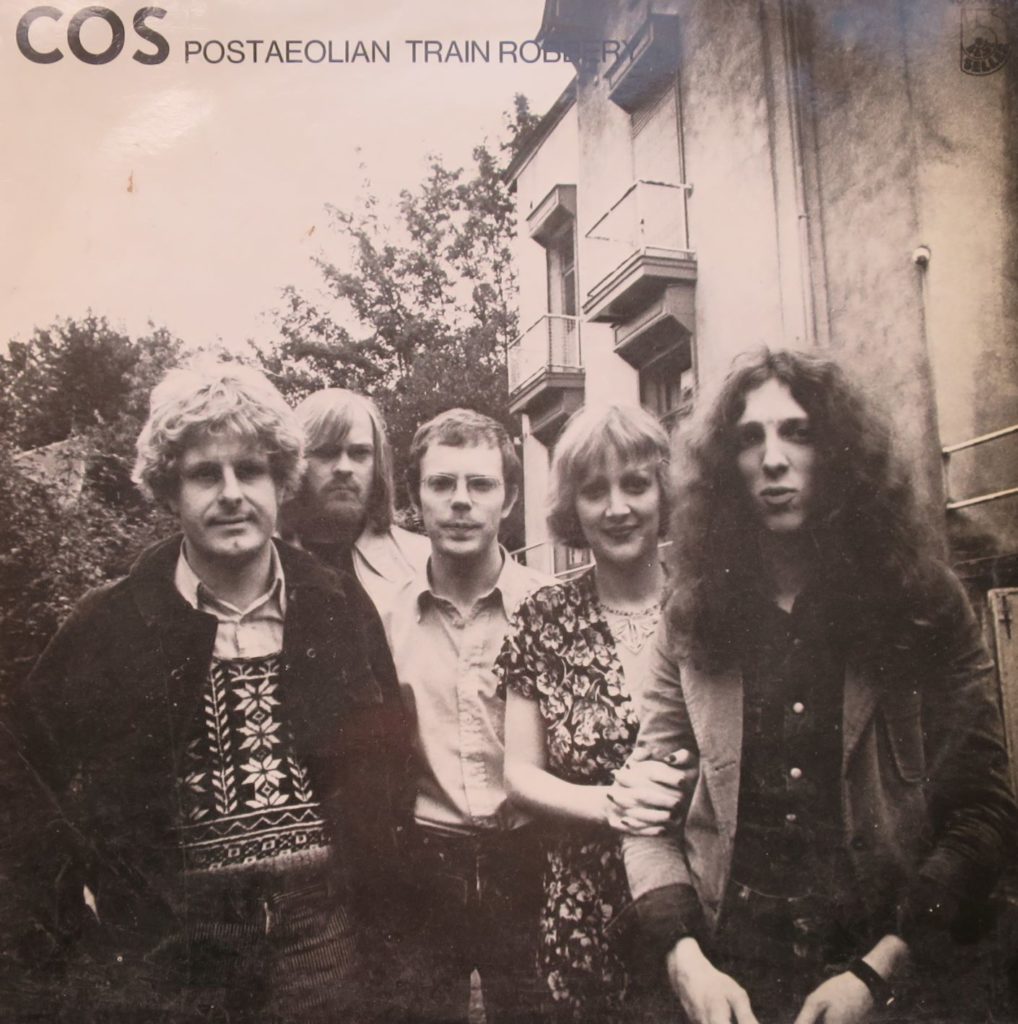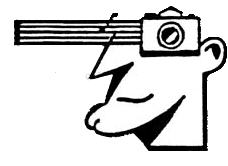Postaolian Train Robbery was recorded August 1974 and had then many releases.


Cos : Postaeolian Train Robbery
(Rewritten by Daniel Schell 2020 08 01)
I just re-read the sleeves of the CD re-issue by Musea, of ‘Postaeolian Train Robbery’. Those notes, which I made with the help of Francis Grosse, relate in detail the birth of COS through the successive variations of the group ‘Classroom’. I will just add here some after thoughts.
‘Classroom’ was a group I created when I was at the University of Brussels. I was a jazz guitar player at the time, and I was influenced by Ornette Coleman, Paul Bley and others. The group was originally composed of Jean-Pierre Destrée on vibes, Martial van Hille on double bass and Guy de Bruyne on drums. We were a straight contemporary jazz group. After a while Jean-Pierre and me moved to London. The big choc was when we heard the Gary Burton-Larry Coryell group at Ronnie Scott’s. We were doing gigs on the London scene.
Back to Belgium, I started to work in computer software. We were still playing jazz and so we met famous Belgian musicians and decided to record two pieces ‘Four Paul S’ and ‘Vas-Y-Voir’ with Babs Robert on sax, Martial van Hille on double bass and Robert Pernet on drums. Actually all famous musicians at the time. This 45RPM vinyl is now a cult ‘CoBrA’ object, with photo by Serge Vandercam and poems by Marcel and Gabriel Picqueray.
I married Pascale de Trazegnies, whose father was a renowned saxophonist and jazz historian. I liked Pascale as a musician, specially the agile coloratur sound of her voice, so I nicknamed her Pascale Son – Pascale Sound- and asked her to sing with us, so we introduced a kind of “ French chanson” idiom, somehow close to Michel Legrand, Charles Trenet, the ‘Double-Six’ but quite on the poetic edge. With Pascale, Classroom started an inventive period accompanied by Jean-Lou Baudoin on bass and Felix Simtaine on drums.
The various Classroom idioms went playing all around, premiering Claude Nougaro and others, until, finally, we went progressively as Cos. We started to play programs where Magma also appeared. That was in a Festival in Liedekerke, somewhere, on the Grand Place of Brussels, Leuven, and other places. The intelligent music, the East European heavy drumming of Christian Vander was of course very inspiring. We played at the Fête de l’Humanité, went friends with Jeff Seffer and François Cahen and accompanied the birth and first tours of Zao.
At that time, I probably changed my mind to a heavier rhythmic form of group and that was COS. “COS” is a term that exists in all languages, it is a Greek Island of course, but also in Alchemy, it is the symbol of work. (1). COS means something in almost any language. I was also quite influenced by the book Lincos, from Hans Freudenthal. LINCOS: Design of a Language for Cosmic Intercourse. It is an autocoded language, it contains its own description, in this sens it shows also a character of optimality, which has always been present in my compositional work. Our Cos language which is mainly phonetic, is influenced by Lincos.
Pascale and me were quite influenced by the aesthetic of Jeff Seffer, by the voice of Mauricia Platon. I admit that I paraphrased this idiom in ‘Cocalnut’.
What made us different, however, was still the inheritance from Classroom, the light jazz aesthetic, the humor, the harmonies and modes. Pascale Son is a light soprano, almost coloratura – she could sing l’Air de la Nuit – so her vocal agility made us quite characteristic also.
Through our new manager Daniel Michiels, we met Patrick Stroobants who offered to record ‘Postaeolian Train Robbery’. We went in a very professional studio, the Start Studio, somewhere in Buizingen, near Brussels, and spent 5 or 6 days there with sound engineer Michel Barez. The record started to sell immediately rather well. It was also highlighted as one of the album of the year by renowned musician and radio artist Marc Moulin. That helped for sure.
‘Postaeolian Train Robbery’ has this polished and heavy jazz touch due to the meeting with two great musicians: Charles Loos on piano and Bob Dartsch on drums. Alain Goutier, on bass brought the rock aspect and maintained it through the whole life of COS. Bob Dartsch brought a Plexiglas trans lucid drum which gives this characteristic drumming sound, accentuated by its heavy and regular stroke. Charles Loos was actually our music director because, a recent alumni of Berkeley, he was the most experienced.
In general, the compositions are marked by my meeting with the modality. The title reflects a famous event of that time, the great postal train robbery, mixed with the Aeolian mode. In ‘Coloc’ I use the locrian mode. In Amafam (“à ma femme”) we use the dorian mode. The rhythmic is influenced by my early study of Indian music. ‘Halucal’ is quite unusual in that I play the bass flute. I use all flutes, soprano, alto and bass in the introduction of ‘Postaeolian Train Robbery’, which shows some influence by Weather Report. We were imposed a ‘commercial’ piece, which I co-signed with Charles: ‘Karbok’ means Quart bok, an old Flemish name for a quarter pint of beer. We refused to put it on the later issues of the CDs. ‘Populi’ is in an invented language, like all the pieces, but this one reflects South America.
After that, COS started to be on its own, going on a large touring schedule, principally in Spain, with tour managers Victor Grau and later Jordi Garcia. And then to Germany, with our future tour manager Jürgen Hellweg, Tours were done with Tony Kleinkramer on keyboards and Willy Masy on drums.
Every COS album has a totally different aesthetic. That is because I evolve and get influenced by what I meet. From ‘Postaeolian’, I remind the energy, the modal force, the mystery, the jazz and rock influence of the time, the Magma-Zao-Weather Report meeting…
Later on, I named my third ensemble ‘Karo’ which means ‘I work’ in Hindi.
Releases: This album had and has and will have many releases. From the original Plus Records ( Patrick Stroobants, director) , it was released two times by by EMI-IBC (Paul Hymans, director). MuseaRecords (Bernard Gueffier director) has released the CD with added tracks from Classroom and a detailed booklet by Francis Grosse. Wah Wah Records (Jordi Segura) from Barcelona has issued (2014) a superb re-edition of the original with booklet plus a photo collection sheet.
